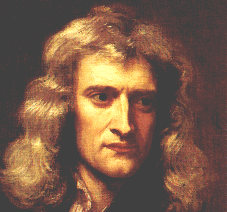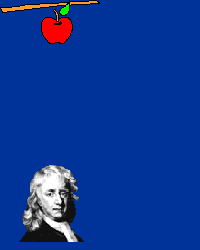Isaac Newton
 Sir
Isaac Newton - newton.org.uk Sir
Isaac Newton - newton.org.uk
Welcome to newton.org.uk -
the virtual museum of Sir Isaac Newton and the
history of science.
http://www.newton.org.uk/
Isaac Newton (1642 - 1727)
Isaac Newton was born in
Lincolnshire, near Grantham, on December 25,
1642, and died at Kensington, London, on March
20, 1727. He was educated at Trinity College,
Cambridge, and lived there from 1661 till 1696,
during which time he produced the bulk of his
work in mathematics; in 1696 he was appointed to
a valuable Government office, and moved to
London, where he resided till his death.
http://www.maths.tcd.ie/pub/HistMath/People/Newton/RouseBall/RB_Newton.html
Sir Isaac Newton
Isaac Newton wurde am 4.Januar 1643
in Woolsthorpe geboren und starb am 31.März 1727
in Kensington.
http://www.chemie.uni-bremen.de/stohrer/biograph/newton.htm
Isaac Newton
Dinoj Surendran
Once upon a time, in a place that no
one has ever heard of --- Woolsthorpe,
Lincolnshire, England --- a tiny lump of flesh
entered the world. It was named Isaac after its
father, who had died three months before. But its
mother remarried and abandoned it to the care of
grandparents till the lump was eleven (and worthy
of a human pronoun).
http://www.geocities.com/CapeCanaveral/Lab/3550/newtonzi.htm
Isaac Newton Links
Here at the Isaac Newton Institute
for Mathematical Sciences, we are often asked
about Newton's life and works. There are already
many excellent and informative Web sites and
books about Newton, so rather than duplicate
those, we have put together a guide to some of
the places, both real and virtual, where you can
find out more.
http://www.newton.cam.ac.uk/newton.html
Isaac Newton (1642-1727)
Bibliography
and Works
Historiographical
Review
Newtonian
Studies
The
Newtonian Party
http://www.lucknow.com/horus/guide/ms114.html
Isaac Newton
Isaac Newton is popularly remembered
as the man who saw an apple fall from a tree, and
was inspired to invent the theory of gravity. If
you have grappled with elementary physics then
you know that he invented calculus and the three
laws of motion upon which all of mechanics is
based. More fundamentally, Newton's mathematical
approach has become so basic to all  of physics
that he is generally regarded as the father of
the clockwork universe: the first, and perhaps
the greatest, physicist. In fact, Newton was
deeply opposed to the mechanistic conception of
the world. A secretive alchemist and heretical
theologian, he performed countless experiments
with crucibles and furnaces in his Cambridge
chambers, analyzing the results in unmistakably
alchemical terms. of physics
that he is generally regarded as the father of
the clockwork universe: the first, and perhaps
the greatest, physicist. In fact, Newton was
deeply opposed to the mechanistic conception of
the world. A secretive alchemist and heretical
theologian, he performed countless experiments
with crucibles and furnaces in his Cambridge
chambers, analyzing the results in unmistakably
alchemical terms.
http://www-ctp.mit.edu/~alford/newton.html
Newton, Isaac (1642-1727)
English scientist and mathematician
who was born into a poor farming family. Luckily
for humanity, Newton was not a good farmer, and
was sent to Cambridge to study to become a
preacher. At Cambridge, Newton studied
mathematics, being especially strongly influenced
by Euclid, although
he was also influenced by Baconian and Cartesian
philosophies. Newton was forced to leave
Cambridge when it was closed because of the
plague, and it was during this period that he
made some of his most significant discoveries.
With the reticence he was to show later in life,
Newton did not, however, publish his results.
http://www.treasure-troves.com/bios/Newton.html
Modern History Sourcebook: Isaac Newton:
Optics
Excerpts from Isaac Newton, Optics,
or, a Treatise of the Reflections, Refractions,
IrMlections and Colours of Light, 4th ed.
(London, 1730).
http://www.fordham.edu/halsall/mod/newton-optics.html
Newton
Isaac Newton's life can be
divided into three quite distinct periods. The
first is his boyhood days from 1643 up to his
appointment to a chair in 1669. The second period
from 1669 to 1687 was the highly productive
period in which he was Lucasian professor at
Cambridge. The third period (nearly as long as
the other two combined) saw Newton as a highly
paid government official in London with little
further interest in mathematical research.
http://www-groups.dcs.st-and.ac.uk/~history/Mathematicians/Newton.html
The Scientists: Sir Isaac Newton
"Nature and Nature's laws lay
hid in sight;
God said, ' let Newton be', and all was
light."
(Pope.)
http://www.blupete.com/Literature/Biographies/Science/Newton.htm
Newton's life
Newton, Sir Isaac (1642-1727),
mathematician and physicist, one of the foremost
scientific intellects of all time. Born at
Woolsthorpe, near Grantham in Lincolnshire, where
he attended school, he entered Cambridge
University in 1661; he was elected a Fellow of
Trinity College in 1667, and Lucasian Professor
of Mathematics in 1669. He remained at the
university, lecturing in most years, until 1696.
Of these Cambridge years, in which Newton was at
the height of his creative power, he singled out
1665-1666 (spent largely in Lincolnshire because
of plague in Cambridge) as "the prime of my
age for invention". During two to three
years of intense mental effort he prepared Philosophiae
Naturalis Principia Mathematica (Mathematical
Principles of Natural Philosophy) commonly
known as the Principia, although this was
not published until 1687.
As a firm opponent of the attempt by King James
II to make the universities into Catholic
institutions, Newton was elected Member of
Parliament for the University of Cambridge to the
Convention Parliament of 1689, and sat again in
1701-1702. Meanwhile, in 1696 he had moved to
London as Warden of the Royal Mint. He became
Master of the Mint in 1699, an office he retained
to his death. He was elected a Fellow of the
Royal Society of London in 1671, and in 1703 he
became President, being annually re-elected for
the rest of his life. His major work, Opticks,
appeared the next year; he was knighted in
Cambridge in 1705.
As Newtonian science became
increasingly accepted on the Continent, and
especially after a general peace was restored in
1714, following the War of the Spanish
Succession, Newton became the most highly
esteemed natural philosopher in Europe. His last
decades were passed in revising his major works,
polishing his studies of ancient history, and
defending himself against critics, as well as
carrying out his official duties. Newton was
modest, diffident, and a man of simple tastes. He
was angered by criticism or opposition, and
harboured resentment; he was harsh towards
enemies but generous to friends. In government,
and at the Royal Society, he proved an able
administrator. He never married and lived
modestly, but was buried with great pomp in
Westminster Abbey.
http://www.newton.cam.ac.uk/newtlife.html
Sir Isaac Newton: The Universal Law of
Gravitation
 There is a
popular story that Newton was sitting under an
apple tree, an apple fell on his head, and he
suddenly thought of the Universal Law of
Gravitation. As in all such legends, this is
almost certainly not true in its details, but the
story contains elements of what actually
happened. There is a
popular story that Newton was sitting under an
apple tree, an apple fell on his head, and he
suddenly thought of the Universal Law of
Gravitation. As in all such legends, this is
almost certainly not true in its details, but the
story contains elements of what actually
happened.
Probably the more correct version of the story is
that Newton, upon observing an apple fall from a
tree, began to think along the following lines:
The apple is accelerated, since its velocity
changes from zero as it is hanging on the tree
and moves toward the ground. Thus, by Newton's
2nd Law there must be a force that acts on the
apple to cause this acceleration. Let's call this
force "gravity", and the associated
acceleration the "accleration due to
gravity". Then imagine the apple tree is
twice as high. Again, we expect the apple to be
accelerated toward the ground, so this suggests
that this force that we call gravity reaches to
the top of the tallest apple tree.
http://csep10.phys.utk.edu/astr161/lect/history/newtongrav.html
Sir Isaac Newton's Mathematical
Principles of Natural Philosophy
Isaac Newton's Principia
1687, Translated by Andrew Motte 1729
http://members.tripod.com/~gravitee/
|



